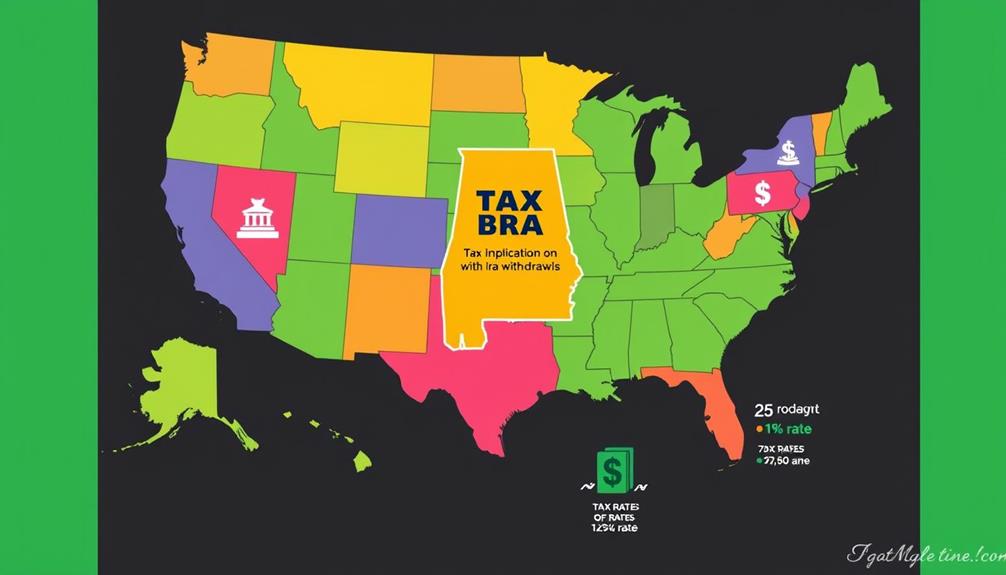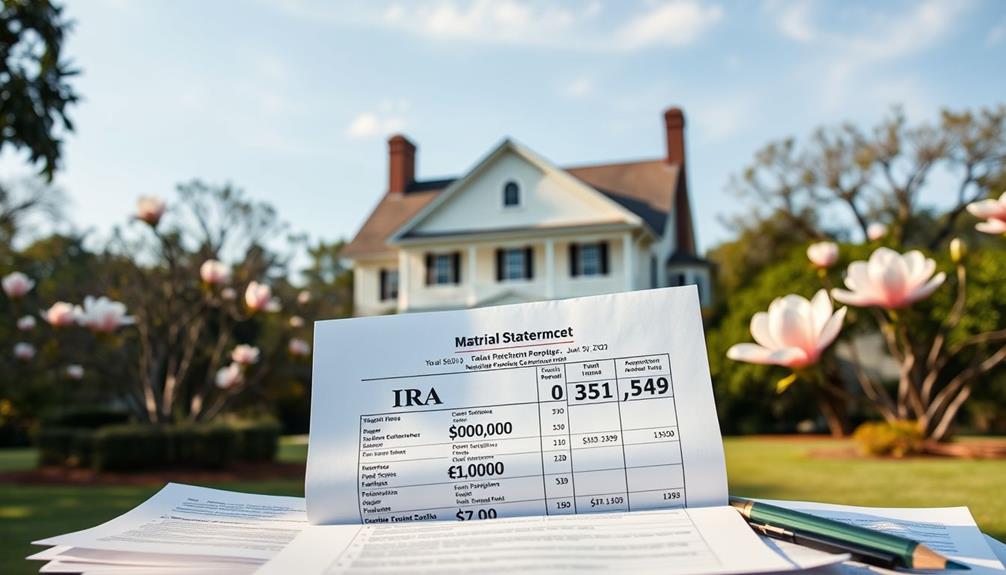When withdrawing from your IRA in Alabama, it is taxed as ordinary income, with rates ranging from 2% to 5%. If you are 65 or older, you can exempt the first $6,000 of your retirement income, which can help reduce your tax burden. Keep in mind that traditional IRA distributions are fully taxable. While Alabama does tax private pensions, there are some exemptions available. Understanding these details can have a significant impact on your retirement strategy. If you are seeking ways to optimize your withdrawals and minimize taxes, there is valuable information available to assist you in making informed decisions.
Key Takeaways
- IRA withdrawals in Alabama are taxed as ordinary income, with rates ranging from 2% to 5%.
- Seniors aged 65 and older can exempt the first $6,000 of retirement income from state income tax.
- Traditional IRA distributions are fully taxable, while Social Security benefits are exempt from state income tax.
- Public pensions are completely tax-exempt, whereas private pensions are subject to state income tax with some exemptions.
- Strategic planning of IRA withdrawals is essential to minimize tax burdens and maximize tax benefits in retirement.
Overview of Alabama's Tax Environment

When considering retirement in Alabama, you'll find that the state's tax environment offers some significant benefits. One standout feature is that Alabama fully exempts Social Security benefits from state income tax, which can help ease your financial burden.
Additionally, for individuals looking to enhance their retirement savings, options like Gold IRAs may provide tax advantages and diversification. However, keep in mind that withdrawals from retirement accounts like traditional IRAs and 401(k)s are considered retirement income taxable and will be taxed as ordinary income.
For seniors aged 65 and older, there's additional relief available. You can exempt the first $6,000 of retirement distributions from state income tax, allowing you to retain more of your hard-earned savings.
On the property tax front, Alabama boasts one of the lowest rates in the nation at just 0.41%, which is another plus for retirees looking to settle down.
While the tax rules around income are favorable, be aware that Alabama's combined state and local sales tax rates can reach up to 13%, one of the highest in the country.
Balancing these factors will help you navigate your retirement planning effectively and make the most of Alabama's tax environment.
IRA Withdrawals and State Taxes

IRA withdrawals in Alabama come with specific tax implications that can impact your retirement planning. When you withdraw funds from your IRA, these amounts are taxed as ordinary income, meaning you'll face Alabama state income tax rates ranging from 2% to 5%.
Unlike Social Security benefits, which are tax-exempt, traditional IRA distributions are fully taxable under Alabama taxes. Additionally, if you're considering diversifying your retirement portfolio, exploring options like a Gold IRA rollover can provide protection against inflation and market downturns.
For retirees aged 65 and older, there's a silver lining: the first $6,000 of retirement distributions is tax-exempt, offering potential savings on your IRA withdrawals.
However, it's essential to remember that federal taxes may also apply, adding another layer of complexity to your withdrawal strategy.
Before making any decisions, consider consulting a tax professional. They can help you navigate the specific tax implications of your IRA withdrawals based on your income levels and age.
Understanding these factors will empower you to make informed choices that optimize your retirement income while minimizing your tax burden. Balancing state and federal taxes effectively can enhance your financial well-being in retirement, so stay proactive about these important considerations.
Exemptions for Seniors

If you're a senior in Alabama, you can take advantage of some valuable tax exemptions that can boost your retirement income.
Understanding the financial mistakes to avoid in retirement planning is essential, as it can help you navigate your tax obligations more effectively.
You can exempt up to $6,000 of your retirement income, including IRA withdrawals, from state income tax.
Understanding these exemptions is vital for managing your overall tax burden and maximizing your financial resources in retirement.
Senior Income Deductions
Many seniors in Alabama can benefit from significant income deductions that alleviate their tax burden. If you're 65 or older, you can exempt up to $6,000 of retirement distributions from state income tax, which includes pension income. This exemption, along with the full exemption of Social Security benefits, can substantially reduce your taxable income.
| Type of Income | Tax Treatment |
|---|---|
| Retirement Distributions | Up to $6,000 exempt |
| Social Security Benefits | Fully exempt |
| Additional Deductions | Based on overall income |
| Total Exempt Amount | Enhances tax benefits |
Understanding these senior income deductions is essential for maximizing your tax benefits in Alabama. Depending on your overall income level and specific circumstances, you may qualify for further deductions, which can further enhance your financial situation in retirement. Be sure to review your eligibility criteria to take full advantage of these opportunities. This way, you can enjoy a more secure and financially stable retirement.
Tax Exemptions Overview
When it comes to tax exemptions for seniors in Alabama, understanding the nuances can greatly impact your financial well-being. If you're 65 or older, you can exempt up to $6,000 of retirement distributions from state income tax, which offers significant tax relief. This exemption applies to various types of retirement income, including pension income, but be aware that private pensions might still incur taxes unless they meet specific exemptions.
For those under 65, the exemption is limited to pension income and doesn't cover other retirement account distributions like IRA withdrawals or 401(k)s. This means that planning your withdrawals carefully is vital to maximizing your tax advantages.
Additionally, seniors may qualify for further deductions, which can lower your overall tax burden in retirement.
Understanding which types of income qualify for these tax exemptions is essential for effective retirement planning in Alabama. By keeping these details in mind, you can make more informed decisions regarding your retirement distributions and potentially save a significant amount on your state income tax.
Taxation of Other Retirement Income

When it comes to retirement income in Alabama, you'll find some favorable tax treatments.
Social Security benefits and public pensions aren't taxed by the state, giving you more financial freedom.
However, if you have a private pension, be prepared to pay state income tax, though you can still exempt a portion based on your age.
Tax Treatment of Pensions
Alabama's tax treatment of pensions greatly impacts retirees' financial planning, especially when evaluating the differences between public and private pensions.
Public pensions are fully exempt from state income tax, which makes them particularly tax-friendly. In contrast, private pensions are subject to state income tax, but there are tax exemptions available. If you're under 65, you can exempt up to $6,000 of your pension income. For those aged 65 and older, the exemption increases to an additional $6,000.
Here are some key points to keep in mind:
- Public pensions: Fully exempt from state income tax.
- Private pensions: Taxed, but partial exemptions apply based on age.
- Social Security retirement benefits: Exempt from state income taxes.
- Withdrawals from retirement accounts: Taxed as ordinary income.
Understanding these nuances in the tax treatment of pensions is vital for maximizing your tax benefits.
Social Security Exemption Details
Retirees in Alabama benefit greatly from the state's full exemption of Social Security retirement benefits from state income taxes. This tax-exempt status provides significant financial relief, allowing you to keep more of your hard-earned money.
Unlike Social Security, private pensions are subject to state income tax, but if you're under 65, you can exempt up to $6,000. For those aged 65 and older, there's an additional $6,000 exemption.
Public pensions and military retirement pay are entirely tax-exempt in Alabama, making them a great option for retirees relying on these income sources.
However, it's crucial to recognize that withdrawals from traditional IRAs and 401(k)s are taxed as ordinary income. This taxation impacts your overall taxable income and can affect your financial planning.
The favorable tax treatment of Social Security and public pensions helps position Alabama as one of the more tax-friendly states for retirees.
Comparing Alabama to Other States

Maneuvering retirement income taxes can be intimidating, especially when comparing Alabama to other states. Alabama imposes state tax on IRA distributions, taxing them as ordinary income, which can reach up to 5% for amounts over $3,000.
In contrast, states like Alaska, Florida, and Tennessee don't impose any personal income tax on retirement income, including IRA withdrawals.
Here's how Alabama stacks up against other states:
- Alabama exempts the first $6,000 of retirement distributions for seniors aged 65 and older, while California and Illinois fully tax IRA withdrawals.
- Unlike Alabama, which taxes private pensions, Florida and Texas provide full tax exemption for pension income.
- Alabama fully exempts Social Security benefits and public pensions from state taxes, unlike Connecticut, where these are partially taxable.
- Arizona offers a flat rate of 2.5% on IRA distributions, which is more favorable than Alabama's graduated rates.
Understanding these differences in the retirement tax environment can help you make informed decisions about your retirement income strategies.
Impact on Retirement Planning

When planning for retirement, understanding the tax implications of IRA withdrawals is essential. In Alabama, these withdrawals are taxed as ordinary income, which means timing and amounts are vital for minimizing your tax burden.
By strategically planning your IRA distributions, you can effectively manage your overall retirement income and reduce the taxes you pay.
One key advantage for seniors aged 65 and older is the ability to exempt the first $6,000 of retirement distributions from state income taxes. This exemption can greatly impact your withdrawal strategy, allowing you to maximize your income while minimizing taxes.
Additionally, since Alabama doesn't tax Social Security benefits, you can plan your IRA withdrawals in a way that preserves your tax-free income sources.
Consulting Tax Professionals

Steering through the complexities of IRA withdrawals in Alabama can be intimidating, especially with the state's unique tax regulations. Consulting tax professionals can provide you with personalized advice tailored to your specific financial situation and help you understand how Alabama's laws affect your retirement distributions.
Here are some key benefits of engaging a tax expert:
- Clarification of tax implications for traditional IRA and 401(k) withdrawals, which are taxed as ordinary income in Alabama.
- Insight into tax exemptions, such as the $6,000 exemption for individuals aged 65 and older, which can greatly impact your overall tax liability.
- Strategies to minimize state tax liabilities, allowing you to optimize retirement income during your golden years.
- Guidance on potential deductions and credits available to seniors, enhancing your financial relief in retirement.
Frequently Asked Questions
Are IRA Distributions Taxable to the State of Alabama?
Yes, IRA distributions are taxable in Alabama. If you withdraw from a traditional IRA, you'll owe state income tax. However, Roth IRA withdrawals may not incur state taxes if specific conditions are met.
Do You Pay State Income Tax on IRA Withdrawals?
Yes, you do pay state income tax on IRA withdrawals. The amount varies based on your total income and the type of IRA. It's wise to consult a tax professional for personalized advice.
Are IRA Contributions Tax Deductible in Alabama?
In Alabama, your IRA contributions can be tax-deductible if you meet certain income levels and participate in an employer-sponsored plan. Consult a tax professional to guarantee you're maximizing your potential deductions effectively.
Do I Have to Pay Taxes When I Withdraw From My Traditional Ira?
Yes, you'll have to pay taxes when you withdraw from your traditional IRA. The withdrawals are considered taxable income, so be prepared to report them on your tax return and pay the applicable state tax.
Conclusion
In Alabama, understanding the state tax implications for IRA withdrawals is essential for your retirement planning. Did you know that nearly 30% of Alabama's retirees rely on retirement accounts as their primary income source? This statistic highlights the significance of knowing how these withdrawals will impact your finances. By traversing the state's tax environment and considering exemptions for seniors, you can make informed decisions that maximize your retirement benefits and secure your financial future.









